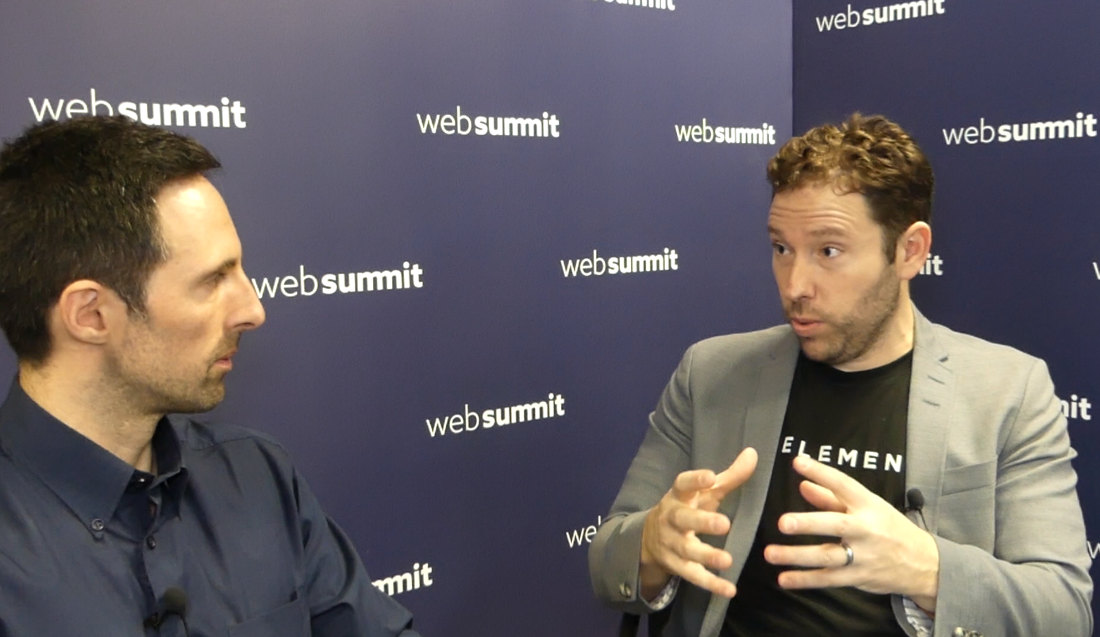We met with Jean-François Gagné, the CEO at Element AI, a global AI software provider that aims to solve real-world problems. Jean-François Gagné has made a name for itself in the field of artificial intelligence. Element AI is not Gagné’s first enterprise. He launched his first company at 20, selling it years later to create another.
Jean-Francois was a speaker at the 2018 edition of Web Summit and he spoke with Via News to let us know where the AI industry is heading and the general current sentiment about the technology.
Miguel Salvado: How was speaking at the Web Summit?
It was amazing. So many people and it’s great to engage with the whole community here. I see everybody from around the world now flying into Lisbon to come to the Web Summit, it’s quite impressive
You’ve been participating in several Web Summit talks. What was that about?
Yes, four talks that required a lot of preparation and they have been amazing. It’s good exposure to talk about different aspects of the company. Not only the company itself, our products but talk a little bit about the impact of technology on society and different industries.
How are people reacting to the AI topic?
Pretty well I think. There’s still some curiosity around the technology but the level of maturity has dramatically improved. People now have a good idea but still curious and wondering how to use this technology and in what situations. People have a lot of curiosity for AI and what it means for everyone
Tell us a little bit about your company, Element AI, what do you guys do?
Our vision is to augment every decision. We’re serving products as a service in the financial sector and supply chain sector. One example of our product which we’ve been presenting earlier is a claim augmentation tool. It enables a large insurance company to digest all of the information around a car accident, for instance, then drives an accurate precise decision for a claim in a matter of a few hours.
Is it all done with AI?
Yes, and what’s interesting about all of our products is that they adapt and learn over time as they’re experiencing a new situation so it’s a collaborative dynamic between some automation on the AI. As soon as the confidence level is not high enough, a user is in the loop. The user is going to deal with the situation, with the customer, and the system will watch and learn so that it can replicate the correction.
How can Businesses use AI and what kind of applications can they use it for?
Everyone is looking for practical usage for AI and I think that’s the big contrast from last year’s questions, which were more high level: what’s AI? Is the tech capable of doing this or that? This year, it’s more practical and people want to engage and talk about it.
There are many applications in insurance, logistics, cyber-security, and several products in different areas and industries.
Give us an example of that
There is one example that we delivered to the Port of Montreal which is a very large port in North America. We’re looking at the pattern of vessels that comes in and orchestrate the whole logistics around it, meaning what container is going to be available, when, what truck should show up. And the opportunity there, because optimization systems have been there for a long time, is the ability to sense and then use physical data (satellite information, information coming from the boats, trucks) and combining all the information to make the system more efficient.
Is that about getting together big data with machine learning?
Yes, and combining all of these insights to drive the right decision at every second. Especially because things go very fast in these operations.
What can we expect from AI over the next 5 to 10 years?
The main takeaway is we’ll see the level of individual productivity continue to increase and accelerate. Productivity for all white-collar jobs is going to go higher and higher, meaning that’s going to be up to the market and companies to decide. Fewer people will be used to do much more so that’s something people are a bit afraid of.
Businesses will wonder if they need more speed? Want to reduce costs? Will be personalizing their service at the same cost to a degree that would have not been able before? These are the three main decisions that companies need to ask when they want to leverage artificial intelligence.
There’s a faster, cheaper and higher quality service and what we’re going to see is that the leverage that each company, each individual, will have using decision making augment tools will make them capable of playing this on different fronts.
We have world-class entrepreneurs referring to the dangers of AI, what’s your take on that?
New leverage creates new opportunities for products and services but the job displacement topic is a fair one and we need to mitigate these consequences.
The world needs to be proactive at addressing this situation, putting in place the right governance and investing in the back. It’s going to create profit and create a lot of efficiencies. We need to redirect a portion of these profits to alleviate the consequences. These two things are not well connected, so we need to make sure that we’re conscious as a society to make choices to make sure we keep the balance in place.
We need to have a positive outcome in the next ten years so you’re going to see a lot of debate on how we should do this and at what speed. There’s going to be a lot of these conversations and I think that as long as we’re transparent about it, we’re going to get a great outcome.
Today we have companies doing logos and art out of AI, AI is going into computer programming. What’s the time-span when we’ll see AI changing the future of work?
The five to ten-year time span is fair. We’ll see AI taking on more and more responsibility on regular mundane tasks, even some cognitive tasks. AI has already taken a lot of the load when it gets to programming, of course, they don’t write in the line of code the same way they do mathematics but it’s the same thing, it’s been automating a lot of rules and a lot of patterns and it’s doing this with mathematical models instead of doing it with people who write code.
This will continue and I think that’s in a five to ten year period that we’ll realize exactly what we’re facing. I don’t think it’s going to be the maximum impact on society, it’s going to take a bit more time but that’s clear when it’s going to happen.
What would you say to a company that is looking to implement AI capability? What should they look for?
The first thing to do is having a clear idea of the outcome they’re looking for. The second step for them is to look at how you are going to be able to get an AI system, whatever that is, to learn about the context and the signal that will lead to these outcomes. Once they have a clear map on this then go seek and work at building either artificial intelligence capabilities yourself, or look for a provider of products and it’s going to help you achieve the desired outcome.
Please share a good piece of advice with young entrepreneurs
Invest in yourself. If you’re starting a company, you’re bringing people along with you but as an entrepreneur, there’s a single outcome that you’re guaranteed to get which is the learning process. If you’re seeking to learn, adapt and get better every day the same way Olympians do, you’ll grow as a person and will eventually end up being successful at some point in time. It should never be about the money or other things, it has to be about your purpose and make sure that your company is aligned with that purpose too. That will help you to rally people around it and help you through the tough times.






